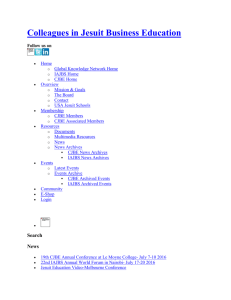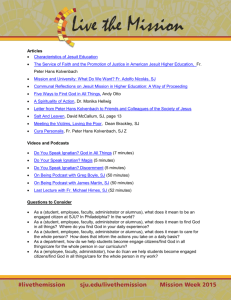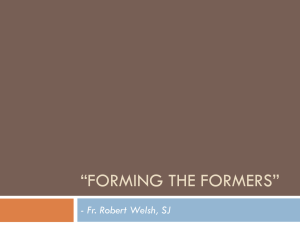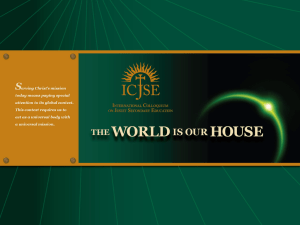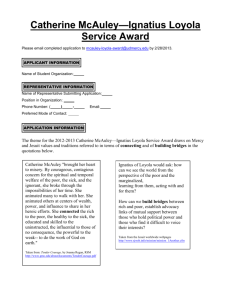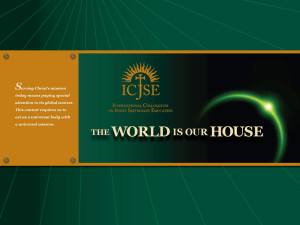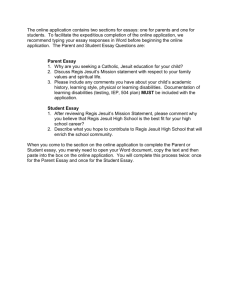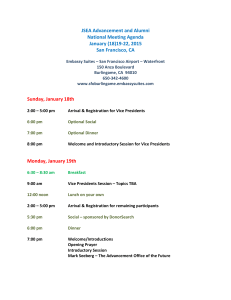Jesuit Education & Ignatian Pedagogy
advertisement
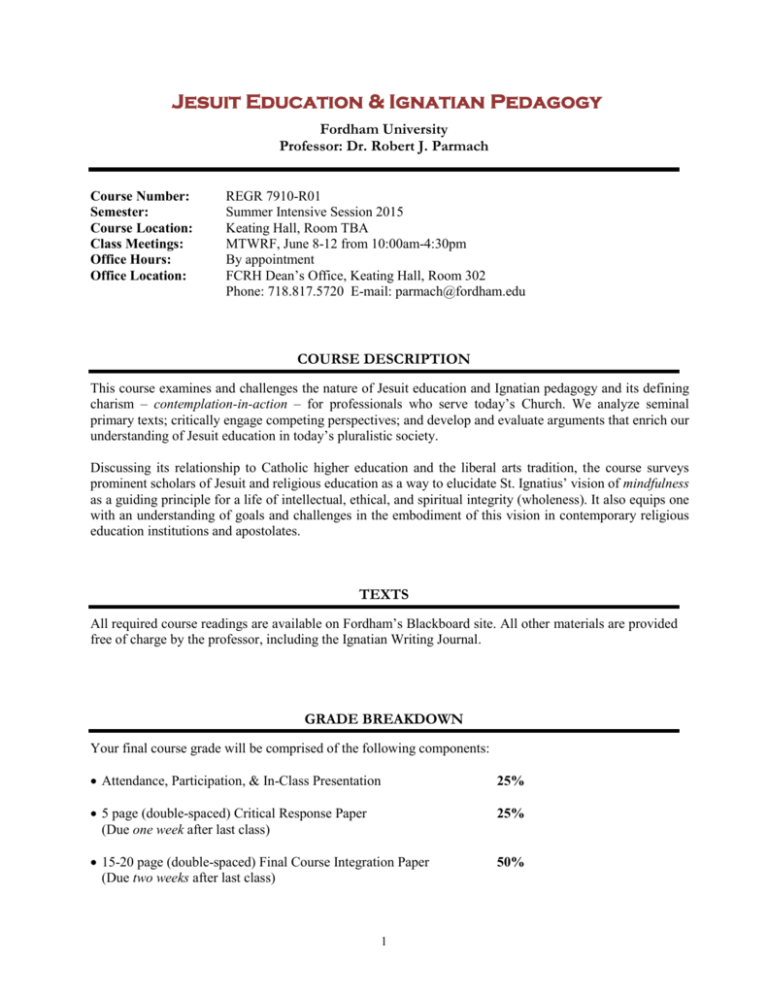
Jesuit Education & Ignatian Pedagogy Fordham University Professor: Dr. Robert J. Parmach Course Number: Semester: Course Location: Class Meetings: Office Hours: Office Location: REGR 7910-R01 Summer Intensive Session 2015 Keating Hall, Room TBA MTWRF, June 8-12 from 10:00am-4:30pm By appointment FCRH Dean’s Office, Keating Hall, Room 302 Phone: 718.817.5720 E-mail: parmach@fordham.edu COURSE DESCRIPTION This course examines and challenges the nature of Jesuit education and Ignatian pedagogy and its defining charism – contemplation-in-action – for professionals who serve today’s Church. We analyze seminal primary texts; critically engage competing perspectives; and develop and evaluate arguments that enrich our understanding of Jesuit education in today’s pluralistic society. Discussing its relationship to Catholic higher education and the liberal arts tradition, the course surveys prominent scholars of Jesuit and religious education as a way to elucidate St. Ignatius’ vision of mindfulness as a guiding principle for a life of intellectual, ethical, and spiritual integrity (wholeness). It also equips one with an understanding of goals and challenges in the embodiment of this vision in contemporary religious education institutions and apostolates. TEXTS All required course readings are available on Fordham’s Blackboard site. All other materials are provided free of charge by the professor, including the Ignatian Writing Journal. GRADE BREAKDOWN Your final course grade will be comprised of the following components: Attendance, Participation, & In-Class Presentation 25% 5 page (double-spaced) Critical Response Paper (Due one week after last class) 25% 15-20 page (double-spaced) Final Course Integration Paper (Due two weeks after last class) 50% 1 COURSE INFORMATION I. Attendance, Participation: Students are expected to be on time for classes, fully prepared and up to date with reading and writing assignments, and critically engaged in class discussions and activities. In-Class Presentation: At the start of classes #2 through #5, each group of assigned students co-present a 20-minute introduction to the readings due that day. This presentation consists of the following: (1) Identify key religious education themes employed in readings; (2) Posit a clear and concise question for discussion in response to one of these themes; (3) Offer both a positive and negative criticism about one of the assigned readings. Provide a half-page presentation outline for members of our class. II. The 5 page Critical Response Paper is to be submitted in Times New Roman, double-spaced, 1” margins all around, 12-point, justified text. Prompt: Identify a major religious education challenge for Jesuit education today: (1) Unpack: Offer a clear and concise summary of the challenge (2 sentences); (2) Situate: Explain why this challenge matters to the field of religious education (4 sentences); (3) Critically Assess: Respond to this challenge by proposing three best practices of its management. Be sure to utilize two themes from course readings (remaining length of assignment). III. The 15-20 page Final Course Integration Paper is to be submitted in Times New Roman, doublespaced, 1” margins all around, 12-point, justified text. Utilizing three course reading themes, offer a critical reflection on how your current work as a religious educator can be further influenced by principles of Jesuit pedagogy and the Ignatian charism of contemplation-in-action. IV. Since this course is a rigorous one-week intensive session, please prepare the readings BEFORE the course begins. Otherwise, there is simply too much material for you to read and digest each night. V. I will provide you with an Ignatian Writing Journal book. After each class, I will offer a Reflection Prompt for you to respond to that evening. (Length: 500 words) 2 COURSE OUTLINE MONDAY MORNING: CATHOLIC HIGHER EDUCATION & LIBERAL ARTS TRAINING Readings: Delbanco, A. 2012. Chapters 1 & 2 in College: What It Was, Is, and Should Be. NJ: Princeton. O’Malley, J.W. S.J. 2004. “Athens and Jerusalem” in Four Cultures of the West. MA: Harvard. Parmach, R.J. 2012. “Theodore M. Hesburgh and His Philosophy of Catholic Higher Education,” Religious Education. Vol. 107:2:174-191. MONDAY AFTERNOON: JESUIT EDUCATION, PART ONE Readings: Florio, P.A., S.J. 2013. “Introduction to Ignatius Loyola, the Society of Jesus, and Jesuit Education,” WA: Catholic University of America. Nicolas, A., S.J. 2010. “Depth, Universality, and Learned Ministry: Challenges to Jesuit Higher Education Today” (Remarks from “Networking Jesuit Higher Education: Shaping the Future for a Humane, Just, Sustainable Globe,” Mexico City, April 23). Tonight’s Ignatian Journal Reflection Prompt: “He who goes about to reform the world must begin with himself, or he loses his labor.” -Ignatius Loyola TUESDAY MORNING: JESUIT EDUCATION, PART TWO Readings: Traub, G.W., S.J. 2007. A Jesuit Education Reader. Chicago: Loyola. Selections: Robert A. Mitchell: “Five Traits of Jesuit Education” Michael J. Buckley: “Education Marked with the Sign of the Cross” Peter Kolvenbach: “The Service of Faith and the Promotion of Justice in Jesuit Higher Education” TUESDAY AFTERNOON: JESUIT EDUCATION, PART THREE Readings: (Continued) Traub, G.W., S.J. 2007. A Jesuit Education Reader. Chicago: Loyola. Selections: Dean Brackley: “Higher Standards” Suzanne M. Erickson: “It’s Noble But Is It Possible?” Howard Gray: “Soul Education: An Ignatian Priority” Tonight’s Ignatian Journal Reflection Prompt: “Seldom deny, rarely affirm, always distinguish.” –Aristotle 3 WEDNESDAY MORNING: JESUIT PEDAGOGY, PART ONE Readings: Duminuco, V.J., S.J., ed. 2000. The Jesuit Ratio Studiorum: 400th Anniversary Perspectives. NY: Fordham. Selections: “The Experience of Ignatius of Loyola: Background to Jesuit Education” “A New Ratio for a New Millennium” “How the First Jesuits Became Involved in Education” “Women’s Ways of Knowing and Learning” “The Characteristics of Jesuit Education” “Ignatian Pedagogy: A Practical Approach” WEDNESDAY AFTERNOON: JESUIT PEDAGOGY, PART TWO Reading: Kolvenbach, P.H., S.J. 2001. “The Jesuit University in the Light of the Ignatian Charism” (Address to the International Meeting of Jesuit Higher Education, Rome, Italy, May 27). Byron, William J., S.J. 2000. Chapter 6: “Living Generously in the Service of Others” in Jesuit Saturdays: Sharing the Ignatian Spirit with Lay Colleagues and Friends. Chicago: Loyola. Selections: Ignatian Pedagogy & Ratio Studiorum: Vincent Duminuco, S.J.: https://m.youtube.com/watch?v=1ykNh8cDSyM Overview: http://youtu.be/CdSJihQxlOU Historical Framework: http://youtu.be/DLUwSzj_ic0 Experience: http://youtu.be/ttVqzMNz2sE Context: http://youtu.be/DA0ZzCBDZI0 Reflection: http://youtu.be/Z1LCbkZnX98 Evaluation: http://youtu.be/lTozww7V3Jg Interactive Class Exercises on Jesuit Pedagogy Tonight’s Ignatian Journal Reflection Prompt: “Pray as if everything depended on God, and work as if everything depended on you.” -Ignatius Loyola THURSDAY MORNING: JESUIT PEDAGOGY, PART THREE Readings: Himes, M.J. S.J. 1996. Chapter 8: “Finding God in All Things: A Sacramental Worldview and Its Effects” in Finding God in All Things: Essays in Honor of Michael J. Buckley, S.J. NY: Crossroad. Cahill, L.S. 2013. "Introduction," in Mary Beth Combs and Patricia Schmidt, eds., Transforming the World and Being Transformed, produced by the “Jesuit Justice in Higher Education Conference Steering Committee.” NY: Fordham. Interactive Jesuit Education and Ignatian Pedagogy Resources: 4 Selections: http://www.slu.edu/cttl/resources/teaching-tips-and-resources/ignatian-pedagogy THURSDAY AFTERNOON: IGNATIAN CHARISM OF CONTEMPLATION-IN-ACTION Readings: Barry, W.A., S.J. & R.G. Doherty, S.J. 2002. Contemplatives in Action: The Jesuit Way. NY: Paulist. Selections: Chapter 3: “In Him Alone: The Tension between Trust in God and the Use of One’s Talents” Chapter 4: “Fruitful Labor: The Tension between Prayer and Action” Chapter 8: “For the Ultimate End: Creative Tensions in the Use of This World’s Goods” Tonight’s Ignatian Journal Reflection Prompt: “Not only words, but also deeds.” -Ignatius Loyola. Are your words embodied by your actions? FRIDAY: WORDS MEETING DEEDS: EMBODIED APPLICATIONS OF LIVED JESUIT TRADITION Readings: Palmer, M.E., J.W. Padberg, & J.L. McCarthy. (trans.) 2000. Ignatius of Loyola. Letters and Instructions. St. Louis: Institute of Jesuit Sources (Selections). Ignatius’ Letter, 1641. “On Dealing With Others” (advice to administrators and teachers) Pope Francis, SJ. 2014. His reflections on Jesuit education & social justice (embodied Quotations for living). Parmach, R.J. 2014. “Eloquentia Perfecta: A Way of Proceeding,” Conversations on Jesuit Higher Education. Vol. 46(2): 39; 2012. “Doing What’s Right: The Value of the Other Half: Qualifying Cura Personalis,” Vol. 41(1): 20-21. Interactive Exercises: Digitized Discernment, Ignatian Web Presence, Conversations That Matter Student Panel: Reflections on Jesuit education and service projects Meditation: The Jesuit Examen (examination of conscience) Growing Up Jesuit Educated Nowadays: Manresa Scholars Program, Fordham University The Spanish Olive, Empowering Fairfield University students Study What??? A Student’s Jesuit Core Curriculum, Fordham University Site Visit & Discussion: Murray-Weigel Hall Jesuit Infirmary 5 COURSE EXPECTATIONS You are expected to attend and be on-time for all classes and with assignments, and actively participate in discussions. Please complete the readings prior to each class. Cell phones are to be turned off before entering our classroom. Note Fordham University’s academic integrity policy in the Student Handbook. Retention of the course material as well as your thinking skills will improve the more engaged you are with thinking about the religious education themes we study. So, re-read, talk with me, talk with others, ask questions, e-mail me, and allow your mind to be uncomfortable with the challenge of enriched thinking. I pledge to provide this intellectual and ethical sense of friction to you, and I expect the same in return. I am around my office often and accessible for consultation. I check voicemail and e-mail throughout the day and look forward to your questions, discussions, and insights. That is why I am here, so that we may learn together. WHAT IS AN INTERLOCUTOR? The word interlocutor derives from two Latin roots: inter (between, among) + loqui (to speak). An interlocutor intentionally disrupts the flow of the conversation, in order to qualify vocabulary used and spark fuller understanding. The interlocutor proceeds by way of the Socratic Method named after the ancient philosopher and teacher Socrates. An interlocutor offers constructive criticism to clean up sloppy and prejudicial thinking. Genuine interlocutors are not filibusters, abusive, or arguing for argument’s sake. Though spirited, they are discerning and careful listeners. As St. Ignatius Loyola (founder of the Jesuits) learned, true wisdom comes through humility and questioning – an essential combination and life skill for religious educators today. LEARNING OUTCOMES General Learning Outcomes: 1. Students will demonstrate facility with methods of research and writing in religious education and pastoral ministry. 2. Students will be able to communicate competently the Christian story and make it accessible through writing, dialogue, and personal consultation. Religious Education Learning Outcome: 3. Students will be able to demonstrate the ability to relate effectively the historical origins, core theories, and methodological approaches of the academic fields of Jesuit education and Ignatian pedagogy to the educational ministries of the church and larger religious and public world, with a specific focus on demonstrating an understanding of the religious and educational development of youth and young adults in the Jesuit tradition. 6
